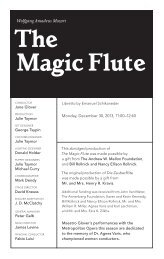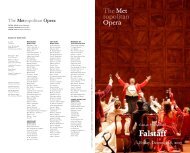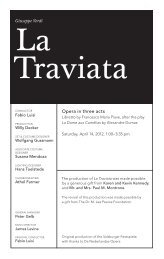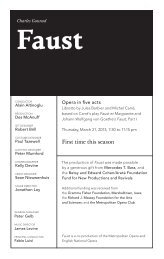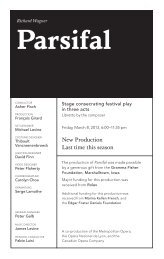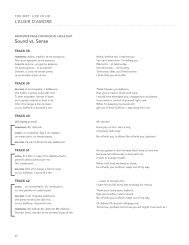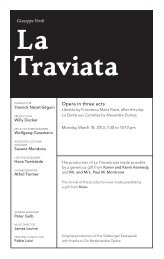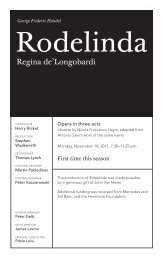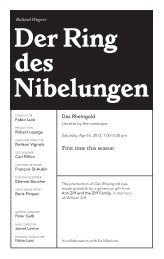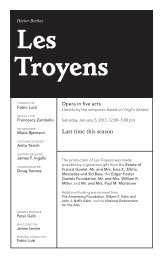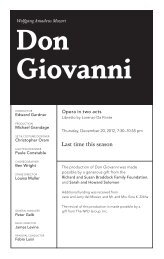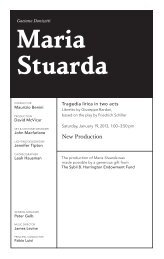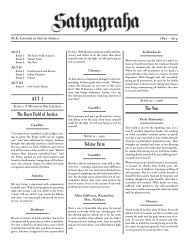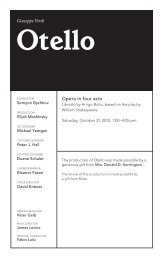The Enchanted Island - Metropolitan Opera
The Enchanted Island - Metropolitan Opera
The Enchanted Island - Metropolitan Opera
You also want an ePaper? Increase the reach of your titles
YUMPU automatically turns print PDFs into web optimized ePapers that Google loves.
32<br />
In Focus: <strong>The</strong> <strong>Enchanted</strong> <strong>Island</strong><br />
World Premiere: New York, <strong>Metropolitan</strong> <strong>Opera</strong>, 2011<br />
Inspired by the 18th-century tradition of the pastiche, <strong>The</strong> <strong>Enchanted</strong> <strong>Island</strong> is a new<br />
work featuring music by some of the Baroque era’s greatest composers and a new<br />
libretto devised and written by Jeremy Sams. A popular genre in its day, a pastiche<br />
(or pasticcio) combines existing music by one or several composers with a new text<br />
and storyline. Handel, Vivaldi, and Rameau all devised pastiches from their own<br />
music. <strong>The</strong> dramatic framework of <strong>The</strong> <strong>Enchanted</strong> <strong>Island</strong> brings together situations<br />
and characters from two Shakespearean plays: during their honeymoon voyage, the<br />
four lovers from A Midsummer Night’s Dream are shipwrecked on Prospero’s island<br />
from <strong>The</strong> Tempest. In addition to the characters found in the original plays, <strong>The</strong><br />
<strong>Enchanted</strong> <strong>Island</strong> imagines the sorceress Sycorax (who is mentioned in <strong>The</strong> Tempest<br />
but never appears on stage) and Prospero vying for control of the island. <strong>The</strong> musical<br />
selections are drawn from the works of a wide range of composers, including some<br />
who are lesser known today, such as André Campra, Jean-Marie Leclair, and Jean-<br />
Féry Rebel. <strong>The</strong> great operas of the early 18th century are remarkably well suited<br />
to this process of rearrangement, since their solos were usually tailored to the skills<br />
of specific performers, and replacements of individual numbers were a common<br />
feature of revivals at the time. (In fact, the stars of the Met production had some<br />
input on the selection of their respective arias.) <strong>The</strong> <strong>Enchanted</strong> <strong>Island</strong> celebrates this<br />
music and pays homage to the tradition of its creation, while also showcasing the<br />
talents of some of today’s most accomplished interpreters of the Baroque repertoire.<br />
<strong>The</strong> Creators<br />
<strong>The</strong> German-born George Frideric Handel (1685–1759) spent most of his career in<br />
London. While his choral and orchestral works have remained popular up to the<br />
present day, his more than 40 operas disappeared from the stage for almost two<br />
centuries. <strong>The</strong> modern Handel opera revival began in the 1920s and has brought<br />
many works back to the repertoire in recent decades. <strong>The</strong> equally prolific Italian<br />
Antonio Vivaldi (1678–1741) likewise is best remembered today for his orchestral<br />
pieces, in particular the violin concertos known as “<strong>The</strong> Four Seasons.” Most<br />
of his operas (he claimed to have written close to a hundred, of which some two<br />
dozen survive) still await rediscovery. Jean-Philippe Rameau (1683–1764), France’s<br />
leading composer in his time, wrote operas in several styles. Although influential,<br />
his œuvre fell into obscurity until interest in early music was revived in the 20th<br />
century. Henry Purcell (1658/59–1695), one of England’s greatest composers, was a<br />
creator of sacred and secular music in a variety of forms. Among his most famous<br />
works is the opera Dido and Aeneas. He contributed music to an adaptation of <strong>The</strong><br />
Tempest in 1694. Other musical numbers in <strong>The</strong> <strong>Enchanted</strong> <strong>Island</strong> are taken from the<br />
works of the Venetian Giovanni Battista Ferrandini (c. 1710–1791) and three French<br />
composers: André Campra (1660–1744), Jean-Féry Rebel (1666–1747), and Jean-<br />
Marie Leclair (1697–1764). <strong>The</strong> plays of William Shakespeare (1564–1616), among the<br />
most highly regarded works in the English language, have provided rich material<br />
for opera composers for centuries. Jeremy Sams, who devised the new libretto for<br />
<strong>The</strong> <strong>Enchanted</strong> <strong>Island</strong>, is a British writer, translator, director, and composer who has<br />
worked with London’s Royal <strong>Opera</strong> House, the English National <strong>Opera</strong>, and the<br />
Royal National <strong>The</strong>atre, as well as on Broadway and in the West End.<br />
Visit metopera.org



